A NEW air cargo industry-wide certification process covering the shipment of pharmaceuticals and perishables across the world will raise standards in the way they are transported, insists the International Air Transport Association (IATA).
The association has launched its Centre for Excellence for Perishable Logistics (CEIV Fresh), which is based on IATA’s Perishable Cargo Regulations (PCRs), that combines professional regulatory and operational input from industry and government experts and is aimed at improving the handling and the transportation by air of all such perishable products, writes Thelma Etim.
Cathay Pacific, Cathay Pacific Services Limited (CPSL), the Airport Authority of Hong Kong (AAHK) and Hong Kong Air Cargo Terminals Limited (HACTL) are the first organisations to pilot the CEIV Fresh programme, having taken a community approach to certification, IATA reveals. This methodology helps align the needs and responsibilities of all stakeholders involved in the handling of perishable goods, asserts the association.
The new certification will give shippers ‘peace of mind’
Glyn Hughes, global head of cargo at IATA, says the new certification will give shippers “peace of mind” in the knowledge that every entity handling their goods is operating to the same standards. “We took a community approach to developing CEIV Fresh recognising that the successful shipment requires the alignment of many stakeholders,” explains Hughes.
Commenting further on the programme, Fred Lam, chief executive of the Airport Authority of Hong Kong, states: “Hong Kong International Airport (HKIA) has been the world’s busiest cargo airport since 2010. With the new certification, HKIA is well-placed to capture the increasing growth opportunities in the market for fresh and perishable goods.”
Figures indicate that the overall global cold chain logistics (CCL) market is expected to be worth US$0.5 billion by the end of 2025.
The cold (or cool) chain is a network of refrigerators, cold stores, freezers, vehicles and boxes organised and maintained so that products are always kept at the correct temperatures to remain fresh during their transportation, storage and distribution from factory to point of use.
Cold chain logistics, a temperature-controlled and transportation supply chain, is vital for the safe and sanitary delivery of temperature-sensitive items, including foodstuffs and pharma products.
North America is the largest CCL consumer and contributor, with a 2017 market share of some 27 per cent. Second place is Europe with a share of more than 26 per cent last year.
Meanwhile, separate research shows the global healthcare cold chain logistics market is forecast to be worth US$16,588.3 million by 2023.
The majority of pharmaceuticals and healthcare-related products, such as vaccines, biopharmaceuticals and clinical trial materials, need to be stored and shipped in a manner which does not compromise their efficacy, so investment in this segment is growing exponentially in the creation of seamless supply chains where the air transportation of these products, including their packaging, handling, storage and delivery are integrated.
Alexandre de Juniac, director general and chief executive of IATA, underscores the importance of the new certification. “The [transportation of] perishable goods is a growing market for air cargo. Ensuring that these delicate and short shelf-life products reach the customer unspoiled with minimal waste and loss is essential,” he asserts.







